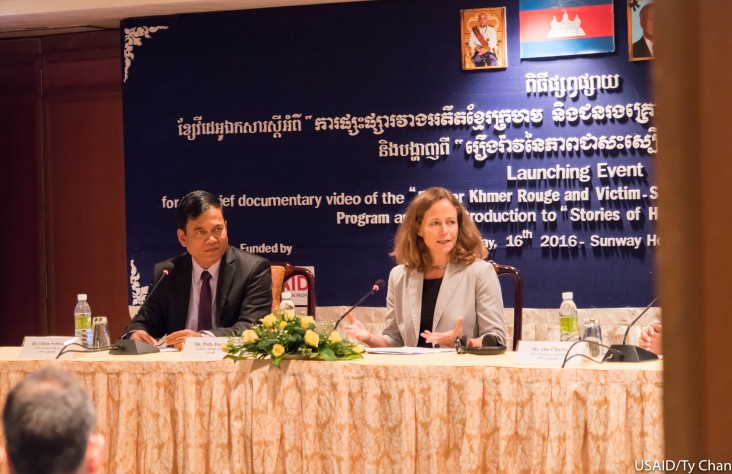
(as prepared for delivery)
Good morning, everyone. It is an honor to be here with you today for this very important event. I would like to take this opportunity to thank USAID’s partner, Transcultural Psychosocial Organization Cambodia (TPO), for organizing this video screening and for inviting me to speak to all of you. As many of you may know, I have recently arrived to Cambodia but I can honestly say that I’ve already gained an appreciation for this beautiful and fascinating country and its people.
With that said, I am also very aware that Cambodia has suffered through many painful years of civil war, including – but not limited to – the almost unimaginable atrocities committed under the Khmer Rouge regime. In preparation for my assignment here, I read the books and watched the movies that have attempted to convey what many Cambodians experienced during that brutal regime. I was deeply touched yet I know I cannot totally understand that period in your history as many of you can. During those years, some of the darkest known to humanity, an estimated one to two million Cambodians died from starvation, forced labor, torture, and execution.
And the effects of the Khmer Rouge regime still linger for many who lived through that terrible period. Remembering and understanding the history of such crimes is critical not only to understanding where we are today, but also to helping us build a better future as a nation and a society.
As a friend of Cambodia, the U.S. government is committed to supporting work in transitional justice and peace and reconciliation. Through USAID, we provide financial support to TPO and other organizations working in the transitional justice sector. As USAID’s partner for the Truth, Reconciliation and Healing Towards a Shared Future project, TPO works directly with former Khmer Rouge members and with the survivors of the regime. Their extraordinary efforts have helped Cambodian people cope with trauma and learn how to live peacefully together in the same communities regardless if one was a former Khmer Rouge member or a survivor of the Khmer Rouge regime. Many of those who suffered under the Khmer Rouge have been able to move forward with their lives.
I am also pleased that USAID recently awarded a new grant to TPO that will further promote trauma healing for individuals and communities whom have experienced torture during Khmer Rouge regime. This new project will also seek to strengthen resilience and foster peace and reconciliation at the community level in 15 provinces. We expect TPO, in collaboration with Kdei Karuna Organization, to leverage their substantial experience to provide interventions to individuals and communities affected by trauma from Khmer Rouge regime and more recent gender based violence, and to support affected individuals to access their rights and achieve justice and healing.
Today’s event marks another milestone of this work. This video will enable young Cambodians to better understand what happened during those difficult years. And we hope that by viewing it, other former Khmer Rouge members and survivors might also address their past and live their lives in peace.
May all of you find this video helpful in understanding not just this period of Cambodian history, but also the rays of light and hope that can be found by people committed to addressing head-on the traumatic legacy of the Khmer Rouge. I wish you continued success as you work to promote transitional justice and trauma healing. “Or Kun Chhroeun”
Related Speeches
- Remarks by Polly Dunford, Mission Director, USAID Cambodia, Launch Event of Feed the Future Cambodia Harvest II
- Remarks by Christina Lau, Deputy Director, Office of Public Health and Education, USAID/Cambodia, Opening Ceremony of the Kick-Off Workshop for “One Health Workforce”
- Remarks by Veena Reddy, Deputy Mission Director, USAID Cambodia, EPIC Showcase







Comment
Make a general inquiry or suggest an improvement.